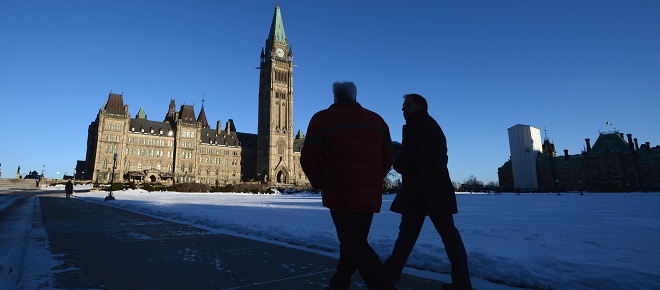How two finance wonks made budget secrecy an issue
Tease the day: Scott Clark and Peter DeVries have taken some hits along the way
Men chat as they walk up Parliament Hill to the centre block in Ottawa, Thursday January 17, 2013. THE CANADIAN PRESS/Sean Kilpatrick
Share

Scott Clark and Peter DeVries have achieved the nearly impossible. The two former senior Finance Canada officials, who’ve teamed up to write extensively about transparent budgeting and financial oversight at the federal level, have turned those issues into things worth talking about on Parliament Hill. They’ve taken some hits along the way, as you might have heard. Prime Minister Stephen Harper and Finance Minister Jim Flaherty, among others, labelled the pair partisan when NDP Leader Tom Mulcair, and others on the opposition side, raised Clark and DeVries’ most recent work during Question Period—repeatedly.
At stake is an article in the next issue of Inside Policy, in which Clark and DeVries claim the budgetary process is so secretive as to undermine parliamentarians’ ability to properly scrutinize government spending. As Aaron Wherry has pointed out, their complaints are not new. But this morning, The Globe and Mail‘s editorialists chime in. Their message is dispiriting: any party in power has contributed to budget secrecy and consolidation of power in central offices; no party has fixed this. The Globe points to several recommendations made by a House committee last year, none of which have been implemented.
Maybe this conversation is, in itself, something of a victory. Some reporters will, now and again, lament the lack of attention paid to parliamentary scrutiny of government spending—an absolutely vital, if extremely technical, duty of parliamentarians. Clark and DeVries have, once again, gotten the ball rolling. Let’s see how far it goes.
What’s above the fold this morning?
The Globe and Mail leads with Bank of Canada Governor Mark Carney’s message that the risk of a housing bubble may have subsided. The National Post fronts Canadian funding of a campaign against anti-homosexual legislation in Uganda. The Toronto Star goes above the fold with the Ontario government’s refusal to disclose complaints against driving instructors who weren’t certified. The Ottawa Citizen leads with Conservative MP Dean Del Mastro’s absence from 26 consecutive meetings of the House ethics committee, of which he is a member. iPolitics fronts the defeat of a Bloc Quebecois motion to repeal the Clarity Act. CBC.ca leads with the death of Canadian music icon Stompin’ Tom Connors. National Newswatch showcases a CBC News report on the tightening national polling numbers for the Conservatives, Liberals and NDP.
Stories that will be (mostly) missed
| 1. Israeli “genocide”. Canadian diplomats walked out of a meeting of the International Atomic Energy Agency after an Iranian official referred to Israel’s apparent “dark record of genocide.” | 2. IT security. Canadian IT bosses are sometimes more concerned with damage to their brand than paying government fines for lax IT security systems, according to a new report. |
| 3. Mandatory French. Quebec’s language advisory body is suggesting that the province mandate small businesses with 25-49 employees employ French as the language of business. | 4. Insurance claims. Canada’s export development agency paid out over $500 million in insurance claims in 2012 thanks to unrest in sensitive countries—a much higher number than previous years. |